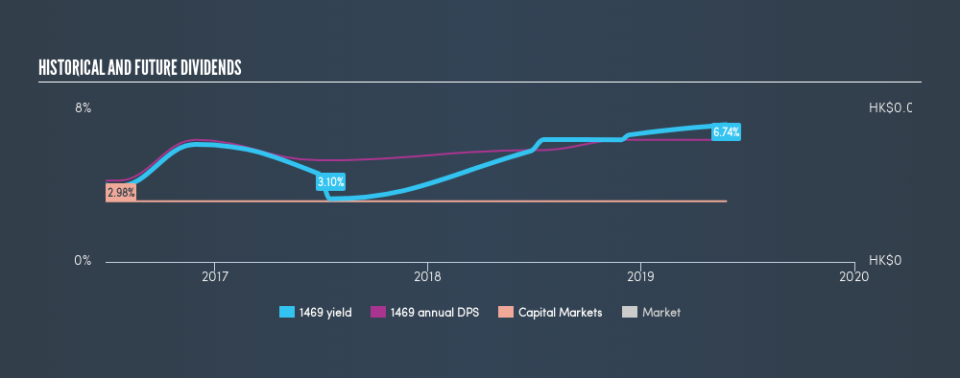Does Get Nice Financial Group Limited (HKG:1469) Have A Place In Your Dividend Stock Portfolio?

Is Get Nice Financial Group Limited (HKG:1469) a good dividend stock? How would you know? Dividend paying companies with growing earnings can be highly rewarding in the long term. On the other hand, investors have been known to buy a stock because of its yield, and then lose money if the company's dividend doesn't live up to expectations.
Get Nice Financial Group pays a 6.7% dividend yield, and has been paying dividends for the past three years. A 6.7% yield does look good. Could the short payment history hint at future dividend growth? There are a few simple ways to reduce the risks of buying Get Nice Financial Group for its dividend, and we'll go through these below.
Click the interactive chart for our full dividend analysis
Want to participate in a short research study? Help shape the future of investing tools and you could win a $250 gift card!
Payout ratios
Dividends are typically paid from company earnings. If a company pays more in dividends than it earned, then the dividend might become unsustainable - hardly an ideal situation. So we need to be form a view on if a company's dividend is sustainable, relative to its net profit after tax. In the last year, Get Nice Financial Group paid out 82% of its profit as dividends. Paying out a majority of its earnings limits the amount that can be reinvested in the business. This may indicate a commitment to paying a dividend, or a dearth of investment opportunities.
Consider getting our latest analysis on Get Nice Financial Group's financial position here.
Dividend Volatility
From the perspective of an income investor who wants to earn dividends for many years, there is not much point buying a stock if its dividend is regularly cut or is not reliable. It has only been paying dividends for a few short years, and the dividend has already been cut at least once. This is one income stream we're not ready to live on. During the past three-year period, the first annual payment was HK$0.04 in 2016, compared to HK$0.06 last year. This works out to be a compound annual growth rate (CAGR) of approximately 14% a year over that time. Get Nice Financial Group's dividend payments have fluctuated, so it hasn't grown 14% every year, but the CAGR is a useful rule of thumb for approximating the historical growth.
It's not great to see that the payment has been cut in the past. We're generally more wary of companies that have cut their dividend before, as they tend to perform worse in an economic downturn.
Dividend Growth Potential
With a relatively unstable dividend, it's even more important to evaluate if earnings per share (EPS) are growing - it's not worth taking the risk on a dividend getting cut, unless you might be rewarded with larger dividends in future. In the last five years, Get Nice Financial Group's earnings per share have shrunk at approximately 84% per annum. If earnings continue to decline, the dividend may come under pressure. Every investor should make an assessment of whether the company is taking steps to stabilise the situation.
Conclusion
When we look at a dividend stock, we need to form a judgement on whether the dividend will grow, if the company is able to maintain it in a wide range of economic circumstances, and if the dividend payout is sustainable. Get Nice Financial Group's payout ratio is within normal bounds. Earnings per share are down, and Get Nice Financial Group's dividend has been cut at least once in the past, which is disappointing. In summary, we're unenthused by Get Nice Financial Group as a dividend stock. It's not that we think it is a bad company; it simply falls short of our criteria in some key areas.
See if management have their own wealth at stake, by checking insider shareholdings in Get Nice Financial Group stock.
We have also put together a list of global stocks with a market capitalisation above $1bn and yielding more 3%.
We aim to bring you long-term focused research analysis driven by fundamental data. Note that our analysis may not factor in the latest price-sensitive company announcements or qualitative material.
If you spot an error that warrants correction, please contact the editor at editorial-team@simplywallst.com. This article by Simply Wall St is general in nature. It does not constitute a recommendation to buy or sell any stock, and does not take account of your objectives, or your financial situation. Simply Wall St has no position in the stocks mentioned. Thank you for reading.


